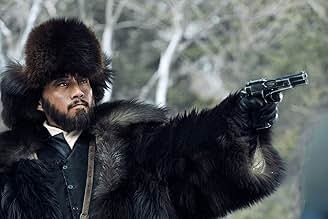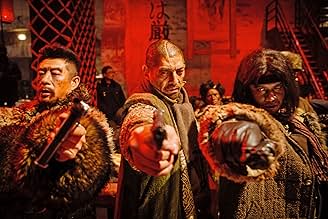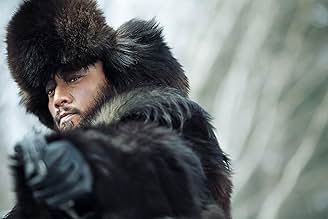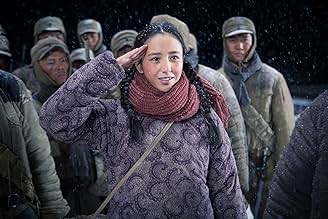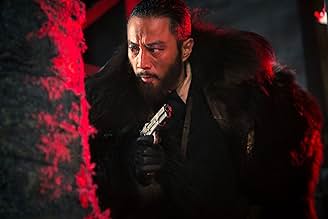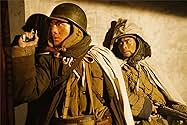IMDb-BEWERTUNG
6,4/10
3474
IHRE BEWERTUNG
Im Mittelpunkt der Geschichte steht ein Konflikt zwischen einer Truppe der Volksbefreiungsarmee und einer Banditenbande im Nordosten Chinas während der chinesischen Revolution.Im Mittelpunkt der Geschichte steht ein Konflikt zwischen einer Truppe der Volksbefreiungsarmee und einer Banditenbande im Nordosten Chinas während der chinesischen Revolution.Im Mittelpunkt der Geschichte steht ein Konflikt zwischen einer Truppe der Volksbefreiungsarmee und einer Banditenbande im Nordosten Chinas während der chinesischen Revolution.
- Auszeichnungen
- 21 Gewinne & 41 Nominierungen insgesamt
Empfohlene Bewertungen
Positive: Good CGI, enough to make it a barely believable background and action scenes, but not great. Loosely based (meaning embellished for entertainment purposes) on post WWII varying factions vying for power in China as Japanese occupiers were being driven out.
Neutral: Interesting tie in with contemporary descendant revisiting and re-imagining that period. Acting, dialogue, script, filming, all acceptable and pretty standard, straightforward, but nothing jumps out as being incredible. It almost felt as if it was a Communist Party sponsored politically correct promotional film. Rather than being a serious historical docudrama it seemed more like a lighthearted fantasy story.
Negative: If looking for historical accuracy, then other than someone infiltrating a gang to spy with some sort of positive outcome for his efforts, it came across as an imaginative fantasy which may be all that a viewer is interested in. Misleading cover art.
Neutral: Interesting tie in with contemporary descendant revisiting and re-imagining that period. Acting, dialogue, script, filming, all acceptable and pretty standard, straightforward, but nothing jumps out as being incredible. It almost felt as if it was a Communist Party sponsored politically correct promotional film. Rather than being a serious historical docudrama it seemed more like a lighthearted fantasy story.
Negative: If looking for historical accuracy, then other than someone infiltrating a gang to spy with some sort of positive outcome for his efforts, it came across as an imaginative fantasy which may be all that a viewer is interested in. Misleading cover art.
I am not a fan of these oriental action films, it is hard to like an action film, when the script is not very interesting, it complicates a little more, totally discouraging ... Unfortunately, I didn't win ...
Very interesting action adventure with some impressive camera work. The action sequences are amazing and the film is totally unpredictable. The tiger scene was incredible! I loved the film, effects, story and music. Very well done.
The best scene for me is the tiger attack, matches by the skills of Zhang. I rewatch it a few times, and begin to notice some 'unlikelihoods'. Even if the camara shots are breathtaking, the riffle of Zhang is a mechanism action, so you have to reload after each shot even if the chamber contains 5 cartridges (like a Muser use in WW2). During the tiger last jump, Zhang load a cartridge but fire 4 bullets, without using the action 'mechanism' ...like an automatic riffle. Zhang can go up and down the tree like an acrobat, sometimes, without even using his legs, but the tiger in unable to climb with his powerful claws. The size of the dead tiger lying on Zhang is quite exagerated... But this is OK from a cinematographic marketing. For the rest of the movie, it will be a lot greater if you keep it simple Mr Director, I mean without the theatricals and too much makeup :)
Tsui Hark movies are always a mixed bag for me. The Vietnamese New Wave director created visually stunning, profoundly philosophical and mostly historically inspired movies like the ''A Chinese Ghost Story'' and ''Once Upon a Time in China'' movie series in his early years that any movie fan should know. In recent years, he rather focused on commercially entertaining, effect-ridden and overall meaningless films such as ''Detective Dee and the Mystery of the Phantom Flame'' and ''The Flying Swords of Dragon Gate''. The latter movies weren't entirely bad but they weren't on the same artistic, authentic and intellectual level as his early classics. ''The Taking of Tiger Mountain'' is situated somewhere in between both categories but probably closer to the second group than to the first.
On the positive side, the movie is partially historically inspired even though the film isn't devoid of a certain propagandistic approach that presents the People's Liberation Army in a much too positive way. The movie basically tells the story of a small group within this army that needs to outsmart a large group of bandits that are raiding villages in the northern parts of the fragile country. The settings of the movie are truly spectacular. The costumes, the villages and even the way the actors speak are truly accurate and trace your way back seventy years in time. Most of the story is set in elegant winter landscapes and one gets to see breathtaking valleys and mountains, simple but charming skiing exercises and even a couple of animals such as the tiger that attacks the protagonist halfway through the movie. In comparison with Tsui Hark's other recent movies, especially the first half of the film feels refreshingly authentic, natural and realistic and only a few effects are used in an efficient way. Towards the climax of the story, more and more special effects are used but they somehow add to the action and tension of the film and don't feel randomly inserted as in many of his other recent films. The action choreographies are stunning and the best example for these intense passages is the battle in the raided village which takes place towards the last third of the movie. While the acting itself is not outstanding, it definitely has more depth than characters in Tsui Hark's more recent films and one can feel some empathy with the smart and mysterious protagonist, the emotional and lonely child or the optimistic female combat medic.
On the negative side, the main villain remains superficial and even ridiculous at certain moments. The short moments of humour when he speaks nonsense or exaggeration when he gestures in theatrical manner feel out of place and unnecessarily decrease the intensity of the movie. The special effects get a little bit exaggerated in the final twenty minutes or so of the movie and contrast the initially authentic magic of the movie that turns into something which isn't a far call from a meaningless Hollywood action flick. The story itself is also a little bit too simple, predictable and one-sided. Another element which I disliked is how the movie was forcedly connected to some random Chinese emigrant living in New York City who can't let go of his culture, family and past instead of trying to become accurately integrated in a foreign country. I feel that this connection to our contemporary world didn't add anything at all to the movie even if the director probably intended to prove that the value of this story based on Qu Bo's novel of the same name from 1957 has been firmly planted in the Chinese national consciousness for more than half a century.
In the end, the numerous positive elements are much more impressive and present than the few negative facts which can be seen as secondary. Tsui Hark somewhat redeems himself after a series of rather shallow flicks that were only aiming for commercial success, modern special effects and simple entertainment. This movie has more depth concerning the characters, magic settings and at least some kind of moral at certain points in the story. This movie still isn't on the same level as Tsui Hark's earliest successes but fans of historically inspired contemporary Chinese action movies can't go wrong with this movie and should therefore give this film a chance.
On the positive side, the movie is partially historically inspired even though the film isn't devoid of a certain propagandistic approach that presents the People's Liberation Army in a much too positive way. The movie basically tells the story of a small group within this army that needs to outsmart a large group of bandits that are raiding villages in the northern parts of the fragile country. The settings of the movie are truly spectacular. The costumes, the villages and even the way the actors speak are truly accurate and trace your way back seventy years in time. Most of the story is set in elegant winter landscapes and one gets to see breathtaking valleys and mountains, simple but charming skiing exercises and even a couple of animals such as the tiger that attacks the protagonist halfway through the movie. In comparison with Tsui Hark's other recent movies, especially the first half of the film feels refreshingly authentic, natural and realistic and only a few effects are used in an efficient way. Towards the climax of the story, more and more special effects are used but they somehow add to the action and tension of the film and don't feel randomly inserted as in many of his other recent films. The action choreographies are stunning and the best example for these intense passages is the battle in the raided village which takes place towards the last third of the movie. While the acting itself is not outstanding, it definitely has more depth than characters in Tsui Hark's more recent films and one can feel some empathy with the smart and mysterious protagonist, the emotional and lonely child or the optimistic female combat medic.
On the negative side, the main villain remains superficial and even ridiculous at certain moments. The short moments of humour when he speaks nonsense or exaggeration when he gestures in theatrical manner feel out of place and unnecessarily decrease the intensity of the movie. The special effects get a little bit exaggerated in the final twenty minutes or so of the movie and contrast the initially authentic magic of the movie that turns into something which isn't a far call from a meaningless Hollywood action flick. The story itself is also a little bit too simple, predictable and one-sided. Another element which I disliked is how the movie was forcedly connected to some random Chinese emigrant living in New York City who can't let go of his culture, family and past instead of trying to become accurately integrated in a foreign country. I feel that this connection to our contemporary world didn't add anything at all to the movie even if the director probably intended to prove that the value of this story based on Qu Bo's novel of the same name from 1957 has been firmly planted in the Chinese national consciousness for more than half a century.
In the end, the numerous positive elements are much more impressive and present than the few negative facts which can be seen as secondary. Tsui Hark somewhat redeems himself after a series of rather shallow flicks that were only aiming for commercial success, modern special effects and simple entertainment. This movie has more depth concerning the characters, magic settings and at least some kind of moral at certain points in the story. This movie still isn't on the same level as Tsui Hark's earliest successes but fans of historically inspired contemporary Chinese action movies can't go wrong with this movie and should therefore give this film a chance.
WUSSTEST DU SCHON:
- WissenswertesThe Tiger is a Siberian Tiger. The largest of the cats.
- VerbindungenRemake of Lin hai xue yuan (1960)
Top-Auswahl
Melde dich zum Bewerten an und greife auf die Watchlist für personalisierte Empfehlungen zu.
- How long is The Taking of Tiger Mountain?Powered by Alexa
Details
Box Office
- Bruttoertrag in den USA und Kanada
- 228.984 $
- Eröffnungswochenende in den USA und in Kanada
- 50.621 $
- 4. Jan. 2015
- Weltweiter Bruttoertrag
- 141.654.055 $
- Laufzeit2 Stunden 21 Minuten
- Farbe
- Sound-Mix
- Seitenverhältnis
- 1.85 : 1
Zu dieser Seite beitragen
Bearbeitung vorschlagen oder fehlenden Inhalt hinzufügen

Oberste Lücke
By what name was Die letzte Schlacht am Tigerberg (2014) officially released in Canada in English?
Antwort


